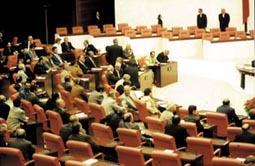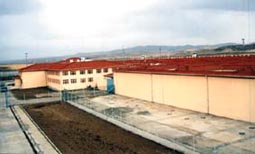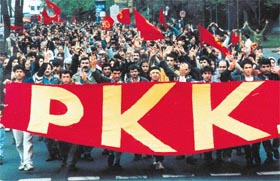15
June 2001
![]()
2. "Turkey introduces civic watchdogs to monitor troubled prisons", Turkey's parliament passed a bill on Thursday introducing civic committees to watch for irregularities and inspect living conditions in the country's troubled jails, the scene of a hunger strike that has claimed 23 lives since the end of 2000.
3. "Now they're officially PKK", the Kurds' declaration of identity campaign began with a petition signed by 1,470 people declaring "I am PKK, too" which was handed in to the Duesseldorf Court. The first official applications in the campaign for the recognition of the national and political identity of the Kurds were made in Germany the other day.
4. 'I am PKK, I worked for my people'", the last hearing of the trial of Mehmet Sait Hasso was held the other day at the Duesseldorf State Court, on the same day and at the same court to which Kurds presented their "I am PKK, too" petitions.
5. "Ocalan's hanging guaranteed", Constitutional amendments bill prepared by all parties sees the death penalty abolished but, in line with MHP's wishes, kept for periods of war, transition to war and terrorism.
6. "Turks to Find Out if There's Life After Washington", hosting a farewell dinner for two of the Turkish Embassy's able diplomats last week, Ambassador Baki Ilkin announced that he, too, was leaving soon -- by mid-September. "What comes next after Washington?
1. - AFP - "Turkish MPs want death penalty abolished, but not for Ocalan":
ANKARA
A Turkish parliamentary commission has drafted a proposal to abolish
the death penalty, but has made sure that condemned Kurdish rebel leader
Abdullah Ocalan remains outside its scope, deputies said Thursday.
The draft, which can still be changed before reaching the general assembly for a final vote, lifts the death penalty except in times of war, an immminent threat of war and for crimes of terrorism, commission members told a press conference. The "terrorism" clause was specially formulated to exclude Ocalan, the head of the outlawed Kurdistan Workers Party (PKK), which has waged a 15-year war for self-rule in mainly Kurdish southeast Turkey. While Ocalan faces no imminent prospect of execution, the coalition's far-right Nationalist Movement Party is firmly opposed to changes that could save him from the gallows, a move also likely to spark public outrage.
No one has been executed in Turkey since 1984 under a de facto moratorium and Ocalan's execution was put on hold after a request by the European Court of Human Rights. Among other major changes the commission proposed, is the lifting of a ban on using "forbidden languages" in the expression and dissemination of thought, which could allow the free use of Kurdish in the media. The proposals are part of a draft of 37 constitutional amendments, prepared by a group of MPs from the five parties in parliament in an effort to catch up with European Union demands on Turkey's road to EU membership. In another change, the inter-party commission proposed an amendment under which banning political parties would become more difficult with tightly outlined criteria to prove constitutional breaches. It also envisaged the inclusion of more civilian members to the country's top policy-making body, the military-dominated National Security Council. Other proposals aimed to improve freedom of expression, expand workers' rights to unionize and limit the president's powers.
Turkey, an EU membership candidate since 1999, must meet
EU criteria on human rights and democracy before it can start accession
talks. The changes agreed between the five party representatives have
a long way to go before being formally adopted. The passage of the whole
package is unlikely by the end of June when the assembly goes into a
recession until October, parliamentary sources said. ![]()
2. - AFP - "Turkey introduces civic watchdogs to monitor troubled prisons":
ANKARA
Turkey's parliament passed a bill on Thursday introducing civic
committees to watch for irregularities and inspect living conditions
in the country's troubled jails, the scene of a hunger strike that has
claimed 23 lives since the end of 2000.
The bill was the third and last item in a package of amendments to reform the much-critised prisons system. The other two laws lifted a ban preventing terrorist convicts associating with fellow inmates in recreational areas and introduced special judges to handle complaints by prisoners and their relatives over breaches of rules by jail authorities. But the reforms failed to satisfy inmates, some 400 of whom are continuing a months-long hunger strike that has so far claimed the lives of 18 prisoners, four relatives and a former inmate. The strikers are protesting at the introduction of jails with one- or three-man cells instead of dormitories, saying the new conditions will isolate them and leave them vulnerable to abuse. Justice Minister Hikmet Sami Turk said the third and last law meant Turkey's prison system had now caught up with contemporary standards. "With these three arrangements, claims of torture and maltreatment will come to an end," he said. The minister called on the hunger strikers "to immediately stop this human drama". Thursday's bill calls for the creation of monitoring committees of five and seven members, who will pay regular visits to prisons and report their findings to the justice ministry and judicial authorities. But the committee memebers will not be able to reveal their reports to the public without prior permission from the authorities.
The members will be elected by local judicial authorities
among candidates who are reputated to hold high moral values, do not
belong to any political party and have studied medecine or social and
political studies. The prison strike has placed Turkey's already troubled
human rights record in the international spotlight at a time when the
country needs to make far-reaching democratic reforms, in order to promote
its request for European Union membership. Despite pressure from the
EU and the Council of Europe -- a European rights watchdog --, Ankara
has refused to negotiate a compromise with the inmates. ![]()
3. - Kurdish Observer - "Now they're officially PKK":
The Kurds' declaration of identity campaign began with a petition signed by 1,470 people declaring "I am PKK, too" which was handed in to the Duesseldorf Court. The first official applications in the campaign for the recognition of the national and political identity of the Kurds were made in Germany the other day.
ASLAN SARAC - ADEM KARACOBAN / DUESSELDORF 
1,470 Kurds signed a petition entitled "I am PKK, too"
in a request that the Kurdish identity be officially recognized and
the ban against the PKK, in effect since 1993, be lifted. The petition
was delivered to the Duesseldorf State Court, where the case of Mehmet
Sait Hasso is being heard on charges that he is a member of the PKK
and had carried out activities on its behalf.
The signatories to the petition began gathering before the court at Olgtanned Str. 65 at 9:00 in the morning, carrying signs with their demands in Kurdish, Turkish and German, and waited silently until Sait Hasso's hearing began at 11:00. When the trial began, the attorneys and Chairman of the German Federation of Kurdish Associations (YEK-KOM), Mehmet Demir, took the petition to the court. Judge Breitling accepted the petition and said that he would take it under consideration. Afterwards, 60 Kurds sat in the courtroom to observe the proceedings.
Five demands announced to the public
While the hearing was continuing inside the courtroom, representatives from YEK-KOM and from the Confederation of Kurdish Associations in Europe (KON-KURD) made a statement to the press outlining the demands of the Kurds. The statement was made by Feride Halitoglu, a member of the Cologne Foreigners' Assembly and a member of the administrative board of the Cologne Kurdistan Center. Halitoglu said that before the states which are members of the European Union imposed their criteria on other countries, they should first apply them to the Kurds within their borders. Halitoglu then read the five items on the "I am PKK, too" petition that the Kurds had signed.
Following the reading of the statement, the crowd began shouting "Biji Serok Apo" (Long live president Apo) and "Long live PKK" and "I am PKK, too."
Police create tension
Meanwhile, there was brief tension when police tried to detain three persons. The Kurds then began a sit-in demonstration in protest of the detentions. The three people were released shortly after the ID's were checked. Kurds who had assembled before the court then gathered behind banners that read "Political freedom," "We were Kurds, we are Kurds, we will remain Kurds," "Political identity is our right, banning it is your shame," and "Freedom for Ocalan, Peace in Kurdistan." Kurds who arrived after the petition had already been presented to the court continued to sign petitions themselves. The new signatures are expected to be presented to the court in the coming week.
Press shows interest
A number of media organizations, including MEDYA TV, ARD, SAT 1, WDR, and Reuters covered this campaign, the Kurds' first declaration of identity campaign.
DEMANDS
1) As an individual of the Kurdish people, I adopt the line of the new period of political and legal struggle that the PKK has been carrying out for the past two years and am saying that "I AM PKK, TOO."
2) I am inviting EU member states to foremost apply the criteria that they are trying to impose on countries other than themselves to the Kurds in their own states. I want for the rights recognized to all people to be legally recognized to the Kurdish people.
3) I am requesting that the values of the Kurdish people, in the cultural and political sense, created by great struggles be officially recognized. In this context, I am saying "Political and National Identity is My Honor."
4) I support the peace project of the PKK's democratic struggle strategy which was presented to the public after its 7th Congress and is the expression of the political will of the Kurdish people. On this basis, I want all prohibitions against the PKK to be lifted.
5) I see the freedom of our national leader President
APO and the assurance of the conditions for him to engage in politics,
the sole guarantee of the realization of a lasting solution to the Kurdish
question, as a criterion. I am saying "Freedom for President APO,
Peace for Kurdistan." ![]()
4. - Ozgur Politika - "'I am PKK, I worked for my people'":
The last hearing of the trial of Mehmet Sait Hasso was held the other day at the Duesseldorf State Court, on the same day and at the same court to which Kurds presented their "I am PKK, too" petitions.
DUESSELDORF
The trial, in which Hasso is being charged with being a member of the PKK and carrying out activities on its behalf, began with the prosecution's reading of the indictment. Following that, M. Sait Hasso and his attorneys presented the final defense. The attorneys asked for the German state to grant the necessary opportunities and support to the new line begun by the PKK.
The attorneys said that the trial should not be considered at a personal level, but as related to the Kurdish problem in general. They also called attention to the potential dangers should Turkey and the European countries fail to support the peace process begun by the PKK.
Hasso, for his part, admitted that he was a member of the PKK and that he had carried out activities in regard to the new peace strategy begun by the PKK. "This is not only my case, but that of the Kurds," Hasso said. Hasso also touched on developments in the Middle East and in Europe, and asked that Europe once again review its approach to the Kurdish problem. Making a rather comprehensive defense, Hasso said in the final section that, "After this, these types of works and activities will be for the PKK's new line. The punishment given to my person will be given to the hands reaching out for peace."
The final ruling in the case is expected to be announced
in one week. ![]()
5. - Turkish Daily News - "Ocalan's hanging guaranteed":
Constitutional amendments bill prepared by all parties sees the death penalty abolished but, in line with MHP's wishes, kept for periods of war, transition to war and terrorism
MHP's Kose points out that draft does not allow Kurdish broadcasting
While it is made harder to dissolve political parties, the technical majority required by the Constitution has been raised to a three-fifths majority
The All-Party Parliamentary Accord Commission has reached a consensus on 37 of 51 proposed constitutional amendments. The amendment regarding the death penalty has been accepted as the Nationalist Movement Party (MHP) wanted it. While the bill ensures that Kurdistan Workers Party (PKK) separatist terrorist leader Abdullah Ocalan can be hanged, an extra provisional article sees to it that he will never be covered by any amnesty.
Speaking at a press conference together with all the commission members, commission chairman and Parliament Deputy Speaker Nejat Arseven said the 37-article document was far from being finalized. He said it would be submitted to the political party leaders for their views and approval. Arseven stated that should the party leaders all approve of the bill, the process of getting it brought to Parliament and legislated could begin. He went on to say that the commission was going to continue its work looking at amendments concerning the president, the Higher Education Board (YOK) and the independence of the Judiciary.
The amendments agreed upon are:
By amending Article 38 of the Constitution, restrictions
are put on the death penalty effectively abolishing it except for crimes
of terrorism and for criminal acts committed during war or transition
to war. The MHP's view as regards executing Ocalan are reflected in
this amendment.
A provisional article added to the bill states the provisions expanding
the scope of amnesties shall not apply to crimes committed before the
law goes into effect. This effectively prevents Ocalan getting any reprieve.
By means of an amendment to Article 87 of the Constitution concerning
the duties and powers of Parliament, the restrictions on Parliament
issuing general and specific amnesties have been lifted by removing
the phrase "with the exception of crimes committed under Article
14". This had meant that crimes of terrorism and crimes against
the state could not be subject to amnesties. Now, these crimes as well
as those committed under the controversial Article 312 of the Turkish
Penal Code (TCK) can bow be pardoned. In addition, the size of majority
required for an amnesty to be passed by Parliament has been increased
to three fifths or 330 seats.
While the bill preserves those articles of the constitution it is a
crime even to suggest amending (Articles 1,2 and 3), it is also stated
that freedom of expression and broadcasting shall not be used to ensure
these articles are amended. MHP's Ismail Kose said that as Article 3
states, "The state, country and nation of Turkey are an indivisible
whole and the language is Turkish," no permission was given for
broadcasts in Kurdish. In contrast to this, by means of a provision
stating that the forms, conditions and procedures to be used when exercising
freedom of expression and of broadcasting be determined by law, some
leeway is afforded to the matter of TV/radio broadcasts in Kurdish.
By amending Article 69, it becomes harder to dissolve political parties.
Just what constitutes the crime of becoming a focal point for unconstitutional
activity requiring party closure has been defined. As the Virtue Party
(FP), currently waiting a verdict to see if it will be closed down or
not, wants, in order to dissolve a party it will necessary for party
members to consistently act unconstitutionally and for the party leadership
to condone it. Furthermore, rather than dissolve a party, the Constitutional
Court will rule to deprive the offending party of state funds. In addition,
a three-fifths majority vote is sought in accordance with the new bill.
An amendment to Article 118 replaces the phrase "MGK decisions
will be given priority notice" to "will be taken into account'.
This allows a measure of flexibility when it comes to complying with
MGK decisions. The bill also sees the Justice Minister becoming a permanent
member of the MGK and the right to vote given to deputy prime ministers
in times of coalitions.
The last paragraph of Provisional Article 15, which prevents anyone
from questioning in the courts laws and decrees passed by the military
regime between 1980-82, has been lifted. Cases to have these laws and
decrees overturned can now be opened.
While it was expected to see deputy's immunity from prosecution limited
to just when he/she was speaking at the rostrum, the bill in fact preserves
it as it is today. A new provision calls for a secret vote to have a
deputy's immunity revoked by Parliament. Should a deputy lose his immunity
but then be reelected, any case against him will continue, according
to a new provision.
Another provision calls for secret ballot when voting to have ministers
put on trial at the supreme court. In addition, a 10-day time limit
has been imposed on the discussion of investigation commission reports
in order to speed up the process.
The application period for Parliamentary Speaker candidates has been
reduced to five days from 10.
Article 86 has been amended to ensure that deputies get cushy pension
rights. ![]()
6. - Washington Post - "Turks to Find Out if
There's Life After Washington":
Hosting a farewell dinner for two of the Turkish Embassy's able
diplomats last week, Ambassador Baki Ilkin announced that he, too, was
leaving soon -- by mid-September. "What comes next after Washington?
There is no next after Washington," Ilkin told guests, echoing
the sentiment of many a diplomat who has given his all in the world's
most important capital. On his watch, the Turkish mission has performed
tricky and demanding tasks, including the completion of a new chancery.
Ilkin, a mild-mannered and patient ambassador in tune with Washington's
political culture, weathered some tough diplomatic and financial challenges
here as Turkey's antiquated ways ran up against attempted reforms at
home.
Since 1998, U.S.-Turkish trade has increased 50 percent. Ankara cooperated in the Balkans, the Caucasus and the Middle East and in recasting military ties with Washington. Addressing the Turkish parliament last year, President Bill Clinton referred to a "strategic partnership," a qualitative change in terminology.
"Baki played a critical role in focusing the Turkish bureaucracy on making our cooperation successful in all these fields and in advocating and getting decisions made in all of them," Mark R. Parris, former U.S. ambassador to Turkey, said yesterday.
Blocking resolutions on Armenian genocide in Congress and helping secure multilateral assistance to defuse Turkey's monetary crisis were just the tip of his laborious lobbying and intensive networking. "Baki has been able to put together an effective coalition inside and outside Congress and to counteract some of the traditional stereotyping," Parris added.
"We did not always agree with everything we saw;
nevertheless, we have come to appreciate the ideas and principles that
Washington's great institutions represent," said First Counselor
Namik Tan, who is returning to the Foreign Ministry in Ankara. "As
Shakespeare would have said, it is not that we love America less, but
that we love Turkey more." Counselor Huseyin Avni Botsali will
be the general consul in Komotini, in an area of northwestern Greece
that is home to an ethnic Turkish minority. The diplomat said he was
looking forward to his post because of improving Greek-Turkish relations.
It will also be a perch from which Turkey can test Greek intentions
toward ethnic Turks, Ilkin noted. ![]()